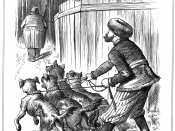First Bulgarian Crisis-Turkish fate concerned all great powers.
-It was a Turkish misgovernment in Bosnia and Herzegovina. It was an oppressive rule of Muslim landowners over Christian peasants, in addition to taxation and labour services. This revolt spread to Bulgaria and part of the Ottoman Empire.
-Localized discontents were turned into a Slav crusade against the Turks growth of nationalist feelings in the Balkans-ÃÂBulgarian AtrocitiesÃÂ had over 10,000 Bulgarians killed by the Turks, :. Britain campaigned against these horrors.
-Russia felt morally obliged to protect the Balkan Christians.
-Austro-Russian co-operation within the terms Dreikaiserbund bec none of them wanted to accelerate the collapse of the Ottoman Empire-Germany could not take sides if there were an Austro-Russian confrontation, so Bismarck wanted the British to intervene, which she had suspicions of Russia, but she didnÃÂt want to do it alone-Despite Austro-Russian co-operation they failed to find solution because a country always intervened against it.
It was too limited or too ambitious-Christian plight increased and Tsarist rule was reproached for not do anything.
-Tsarist government didnÃÂt want to declare war because it had little to gain and was afraid from Austrian and British opposition. Austria said she wouldnÃÂt intervene if she had everything she wanted, Britain would not tolerate Russia gaining things over Turkey.
-Serbia defeated the Turks, so Russia declared war, Britain was in favour of the Turks. Russia won but she lost the peace because she put severe terms on Turkey in the Treaty of San Stephano. Russia gained territories and occupation over Great Bulgaria.
-GermanyÃÂs attitude ÃÂ would not chose sides-BritainÃÂs attitude ÃÂ dispatched soldiers-Due to Austro-British hostility and a threat of war, Russia agreed to revise at an international conference.
-During conference Greater Bulgaria was then divided into three, a part under Russian supervision, one independent under Turkish Emperor, and Macedonia was returned to the Turkish-The great powers also gained a few things (Britain gained a bit of land out of this conference), Russia recovered Besserabia, acquired a valuable port. Either protest of Turks or Russians were ignored. Britain had the right to send warships into Black Sea if necessary-Congress of Berlin reasserted that Turkeys fate was a concern to all although it only affected the Ottoman Empire. There was no war between great powers, and this was a sign of GermanyÃÂs new power and influence over Europe.
What caused the Crisis?Turkey was the ÃÂsick man of EuropeÃÂ because it was disintegrating and Balkan nationalism was rising. Christian peasants were beginning to rise against the oppressive rule of Muslim landowners and have taxation and labour services. The revolt spread to Bulgaria and Ottoman Empire.
Why were the major European powers involved?Austria-Hungary was a multi-national empire trying to control Slav nationalism within. After having lost German and Italian territories it had to hold Balkan territory. In addition it was afrain of Russian influence in the BalkansRussia was under moral obligation to protect Christian Slavs from Muslim TurksBritain was always suspicious from the RussiansGermany was decided not to take sides.
What attempts were made to stop the crisis ÃÂ How was a major war avoidedThe treaty of Berlin set out the parameters that everyone would follow. What would Russia and the Turkish do. It checked Russian ambition and Turkish excessesRelating to WWI there werenÃÂt as many alliance systems so a huge war couldnÃÂt take place.
Although the diplomatic situation is broader the conflict is localized therefore avoidance of war was straight forward.
Treaty of San Stephano was too strong and the Treaty of Berlin averted it.
Were the fundamental issues resolved?Britain gained a few lands and Austria-Hungary gained control of Bosnia-Herzegovina.
After Russians intervention and the Treaty of San Stephano, the Empire was divided into three parts.
-Northern part ÃÂ Bulgaria, complete intervention under Russian supervision-South ÃÂ Eastern Rumelia ÃÂ self-government under Turkish emperor-Macedonia to TurkeyThe great powers also gained a few things, Russia recovered Besserabia, acquired a valuable port. Either protest of Turks or Russians were ignored. Britain had the right to send warships into Black Sea if necessary.
Germany was able not to intervene and have to chose sidesSecond Bulgarian Crisis-1885a revolt broke in Eastern rumelia in favour of union with Bulgaria. This went against the Treaty of Berlin, which Russia would dominate Bulgaria and increase her influence in the Balkans. The Russians however had created a resentment in Bulgaria by treating it as a Russian satellite.:. Bulgarians expelled the Russians, and Bulgaria accepted to join with Rumelia.
-When the great powers met, R sad the revolt was a violation of the Treaty of Belin. G and A-H supported R . B thought theRumenia and Bulgaria should become united under the Prince of Bulgaria. This idea was because they had gotten out of Russias rule. It was better to have a larger Bulgaria F and I backed B so this was adopted. But the Tsar got his revenge forced the Prince of Bulgaria to abdicate. Bulgaria resisted so maybe Russia would invade, A-H warned R against further interference.
-Bismarck would not take sides. He was indifferent to who ruled Bulgaria. This didnÃÂt satisfy the Tsar, cho said he would refuse to renew the Dreikaiserbund. So Bimarck thought Tsar might join with F. :. Bismarck proposed a secret Russo-German alliance.
-= Reinsurance Treat 1887 G recognized RÃÂs influence in Bulgaria. R would control the Straits if needed. If either were at war the other would remain neutral unless F or A-H were attacked. This meant G and R now became close and prepared to break Austro-German alliance (1879).
-R = A-H almost war over Balkans. F wanted a dispute with G. threat of F-r ALLIANCE-If B played a role resisting R, it would help G bec R would be prevented from being too aggressive over Bulgaria = A-H could find support from Britain.
-Conclusion of Secret Treaty = didnÃÂt reduce dance of war over Balkans, Bulgaria continued causing tension. Since G gave R its ambitions there was no crisis. B and I proved allies of A-H allowing G to do nothing. :. Bismarck exerted all his influence on B to make an agreement with I and A-H to defend power balance in the Near Esat and Mediterranean.
-= Second Mediterranean Agreement = R would be checked his power by the Great powers over Bulgaria. :. R couldnÃÂt use force.
-Despite the Reinsurance Treat R-G relations didnÃÂt get better due to Bismarck because he wouldnÃÂt lend $ to R to finance industrialization so R turned to F developing an important link that developed for yeas.
-1880-1890 B was sacked and the new Kaiser Wilhelm II had anti-Russian sentiments. Industrial and agrarian groups felt threatened by RÃÂs economic modernization. Militarily they thought about preventive war against R if she became too powerful.
-B resigned due to disagreement between him and Kaiser over renewing Reinsurance Russian alliance. Bec Bismarck always had doubts from its relationship with R as the answer for GÃÂs security. :. Maybe there could be an alliance with Britain.
NOTES TAKEN FROM MY HISTORY CLASS AND IB WORLD HISTORY TEXTBOOK





